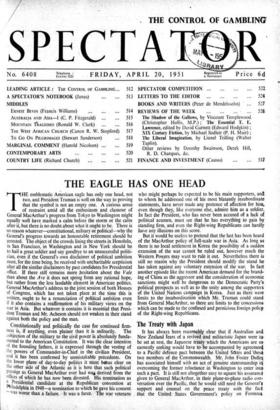THE EAGLE HAS ONE HEAD
THE emblematic Anierican eagle has only one head, not two, and President Truman is well on the way to proving that the symbol is not an empty one. A curious sense of restraint amid all the enthusiasm and clamour of General MacArthur's progress from Tokyo to Washington might equally well have marked a calm before the storm or the calm after it, but there is no doubt about what it ought to be. There is no reason whatever—constitutional, military or political—why the General's progress towards an honourable retirement should be arrested. The object of the crowds lining the streets in Honolulu, in San Francisco. in Washington and in New York should be to hail a great soldier and say goodbye to an unsuccessful politi- cian, even if the General's own disclaimer of political ambition must, for the time being, be received with uncharitable scepticism after all the similar disclaimers by past candidates for Presidential office. If there still remains more hesitation about the Vale than about the Ave it does not spring from any rational hope, but rather from the less laudable element in American politics. General MacArthur's address to the joint session of both Houses of Congress, which has not taken place at the time this is written, ought to be a renunciation of political ambition even if it also contains a reaffirmation of his military views on the war in Asia. But whatever it contains it is essential that Presi- dent Truman and Mr. Acheson should not weaken in their stand against both the policy and the man.
Constitutionally and politically the case for continued firm- ness is, if anything, even plainer than it is militarily. The subjection of the military to the civil power is absolutely funda- mental to the American Constitution. It was the clear intention of the founding fathers, it is expressed through the vesting of the powers of Commander-in-Chief in the civilian President, and it has been confirmed by unmistakable precedents. On the lower plane of day-to-day politics it must boas clear on the other side of the Atlantic as it is here that such political prestige as General MacArthur ever had wag derived from the offices of which he has now been divested. His nomination as a Presidential candidate at the Republican convention at Philadelphia in 1948—a nomination to which he gave his consent — \% as worse than a failure. It was "a farce. The war veterans who might perhaps be expected to be his main supporters, and to whom he addressed one of his most blatantly insubordinate statements, have never made any pretence of affection for hint, even though they, like everyone else, admire him as a soldier. In fact the President, who has never been accused of a lack of political acumen, must see that he has everything to gain by standing firm, and even the Right-wing Republicans can hardly have any illusions on this score. But it would be useless to pretend that the last has been heard of the MacArthur policy of full-scale war in Asia. As long as there is no local settlement in Korea the possibility of a sudden extension of the war cannot be ruled out, however much the Western Powyrs may want to rule it out. Nevertheless there is still no reason why the President should modify the stand he has taken against any voluntary extension of the war. In fact another episode like the recent American demand for the brand- ing of China as the aggressor and the consideration of economic sanctions might well be dangerous to the Democratic Party's political prospects as well as to the unity among the supporters of the United Nations campaign in Korea. Just as there were limits to the insubordination which Mr. Truman could stand from General MacArthur, so there are limits to the concessions which can be made to the confused and pernicious foreign policy of the Right-wing Republicans.


































